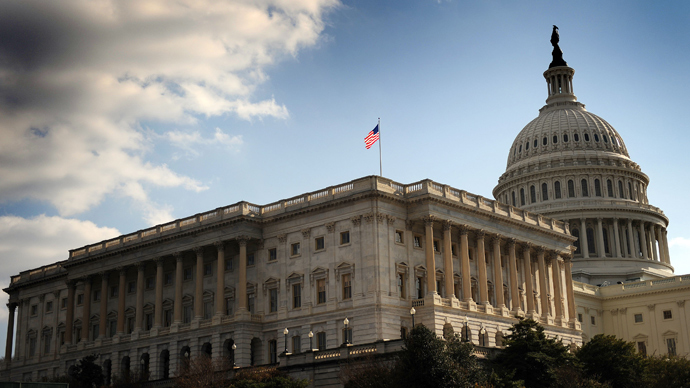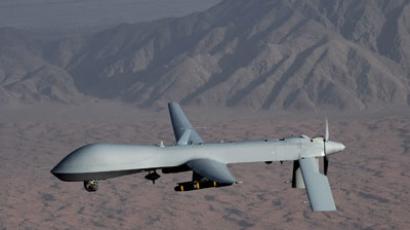Congress rejects mandatory numbering of drone casualties

Two proposals that could have brought new levels of accountability and transparency to the United States’ controversial weaponized drone program were rejected by the House of Representatives on Thursday.
The amendments, both introduced by Rep. Adam Schiff (D-California), were offered as possible provisions to be tacked onto the Intelligence Authorization Act for Fiscal Year 2014. The Republican-controlled House Intelligence Committee canned the proposals, however, and a markup of the bill absent those amendments was passed by a voice vote.
Schiff, a 53-year-old lawmaker with nearly two decades of public service under his belt, unsuccessfully proposed amendments that would have required the US intelligence community to annually disclose the number of casualties caused by American drone strikes and install an independent review board to oversee instances when US citizens may be targeted for execution by unmanned aerial vehicles.
Although independent, international watchdog groups have attributed US drone strikes with thousands of casualties, including many involving innocent civilians, the White House has rarely acknowledged the largely covert operations.
During a May 2013 address at the National Defense University, US President Barack Obama said the nation was entering a new phase with regards to it counterterrorism measures, and that, “before any strike is taken, there must be near certainty that no civilians will be killed or injured, the highest standard we can set.”
“There’s a wide gap between US assessments of such casualties and nongovernmental reports,” the president acknowledged at the time. In a statement on his website this week, Rep. Schiff said the first of two amendments — one which mandates the annual reporting of combatant and non-combatant deaths and injuries —“would help narrow that gap.”
“The production of this report will require minimal resources, but will provide a modest but important measure of transparency and oversight,” Schiff insisted.
Patrick Boland, a spokesman for Rep. Schiff, confirmed to Reuters on Thursday that that amendment was rejected by a vote of 15-5.
The second proposal offered by the Democrat would have mandated that “red team” reports be prepared before a US person is potentially targeted with lethal force, and that those files be eventually declassified a decade later.
“While this or other administration may put in place internal processes, codifying the process would ensure that our commitment to oversight of the incredibly weighty decision to potentially target a US citizen is a common sense reform,” wrote Schiff. His amendments were introduced roughly two years and one month after Anwar al-Awlaki, a US-born imam with ties to Al-Qaeda, was executed in Yemen by a drone. “It will serve to increase the confidence in our assessments, and provide an additional measure of transparency through the Intelligence Committees and the Inspector General," the lawmaker said.
That amendment was rejected by the committee as well, according to the congressman’s website and a Reuters report, but Schiff’s office said he “plans to continue fighting for these and other reforms as the bill moves to the House Floor and conference with the Senate.”
Days earlier, Schiff had met with Ali Jaber, a 55-year-old Yemeni government engineer who has come to America to demand compensation for the loss of life and property in his village that he blames on US drone strikes.
"It's one thing to read about collateral damage. It's another to talk to someone who lost their brother-in-law and their nephew," Schiff told NBC News after his meeting on Wednesday. "I was struck by the perspective that people in his village go about their lives thinking, at any moment, that if they make the wrong turn, or are in the wrong place at the wrong time, the heavens may open up and it may be the end of their existence."
According to Britain’s Bureau of Investigation Journalism, Pres. Obama has authorized at least 326 drone strikes between entering office and the end of last month. And although his administration’s propensity to rely on unmanned aircraft has indeed diminished in recent months, Pakistani officials claimed this week that three drone-fired missiles destroyed a compound in Khyber Pakhtunkhwa containing an Islamic school.
Upon news that the House committee completed their markup of next year’s intelligence authorization bill, Chairman Mike Rogers issued a statement saluting the “good, bipartisan work” involved in crafting the act, which he predicts will increase attention to counterintelligence effort and shape the execution of important national security policies.
“Our nation continues to face violent and changing threats from terrorists and other groups that want to harm Americans and American interests,” Rep. Dutch Ruppersberger (D-Maryland), a ranking member of the House Intelligence Committee, added in a statement. “It is the House Intelligence Committee’s responsibility to give our intelligence professionals the resources, authorities and capabilities they need to protect our nation, while also conducting effective oversight. This solid, bipartisan bill does that by protecting our national security while also protecting privacy and civil liberties.”
Although Rogers and Ruppersburger’s committee failed to advance the Californian’s attempt at increasing transparency with regards to America’s covert drone wars, the markup they did approve of adds $75 million to address insider threats and provides funding for new counterintelligence positions within the federal government, while at the same time removing more than $130 million from the nation’s space budget.
Additionally, the committee passed an amendment requiring the declassification of documents collected by Osama bin Laden’s Abbottabad, Pakistan compound during the 2011 raid that ended his life “to further highlight Al-Qaeda’s growth and spread under bin Laden’s leadership,” and no doubt provide more ammo for their argument that secretive drone strikes must continue as is in lieu of a lack of oversight.














